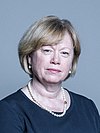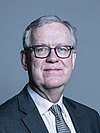Lords Commissioners
This article needs additional citations for verification. (July 2021) |
| This article is part of a series on |
| Politics of the United Kingdom |
|---|
 |
|
The Lords Commissioners are Privy Counsellors appointed by the Monarch of the United Kingdom to exercise, on his or her behalf, certain functions relating to Parliament which would otherwise require the monarch's attendance at the Palace of Westminster. These include the opening and prorogation of Parliament, the confirmation of a newly elected Speaker of the House of Commons and the granting of Royal Assent. The Lords Commissioners are collectively known as the Royal Commission. The Royal Commission includes at least three—and usually five—Lords Commissioners. In current practice, the Lords Commissioners usually include the Lord Chancellor, the Archbishop of Canterbury (who is named but usually does not participate), the leaders of the three major parties in the House of Lords, the convenor of the House of Lords Crossbenchers and (since 2007) the Lord Speaker.[citation needed] Occasionally there are substitutions (such as deputy party leaders) if the normal commissioners are unavailable.
The Lord Chancellor serves as the most senior Lord Commissioner after the Archbishop of Canterbury, who in modern times never participates in the Commission. Traditionally the Lord Chancellor took part in the ceremony and presided over the Royal Commission. However, since the 2007 appointment of Jack Straw, a member of the House of Commons, as Lord Chancellor the person in that office does not participate in Royal Commissions, much like the Archbishop of Canterbury. In this case, the Leader of the House of Lords performs the duties of the Lord Chancellor, with the Lord Speaker of the House of Lords serving as a Lord Commissioner. Exceptions to this procedure were seen in 2009 and 2019, when royal approbation was declared to the elections of John Bercow and Lindsay Hoyle as Commons Speaker. On these occasions the Lord Chancellor, respectively Jack Straw and Robert Buckland, performed this function personally and the Lord Speaker did not serve as a Lord Commissioner.
The Lords Commissioners enter the chamber of the House of Lords at the appointed time, and take seats on a structure temporarily placed for the duration of the ceremony. The Lord Chancellor or Leader of the House of Lords, as the most senior Lord Commissioner, commands the Gentleman/Lady Usher of the Black Rod to summon the House of Commons. Representatives of the House of Commons arrive at the Bar of the House of Lords, and bow thrice, but do not actually enter the Lords Chamber. After each bow, male Lords Commissioners doff their hats to the Members of Parliament while female Lords Commissioners bow their heads in return. The Reading Clerk of the House of Lords then reads the Monarch's Commission, which authorizes the Lords Commissioners. After the appropriate business has been transacted, the Commons again bow thrice and depart.
Lords Commissioners[]
The following people are participating* and non-participating† Lords Commissioners since 2019:[1]
| Image | Officeholder | Office(s) | Since |
|---|---|---|---|

|
Justin Welby | Archbishop of Canterbury† | 4 February 2013 |

|
Robert Buckland, MP | Lord High Chancellor of Great Britain† | 24 July 2019 |

|
The Lord McFall of Alcluith | Lord Speaker* | 1 September 2016 |

|
The Baroness Evans of Bowes Park |
|
14 July 2016 |

|
The Baroness Smith of Basildon | Leader of the Labour Party in the House of Lords* | 27 May 2015 |

|
The Lord Newby | Leader of the Liberal Democrats in the House of Lords* | 13 September 2016 |

|
The Lord Judge | Convenor of the Crossbench Peers* | 1 October 2019 |
References[]
- ^ "House of Lords Business". publications.parliament.uk.
External links[]
- Royal Commissions at the UK Parliament website
- Royal Assent by Commission at the UK Parliament website
- Parliament of the United Kingdom
- Constitution of the United Kingdom